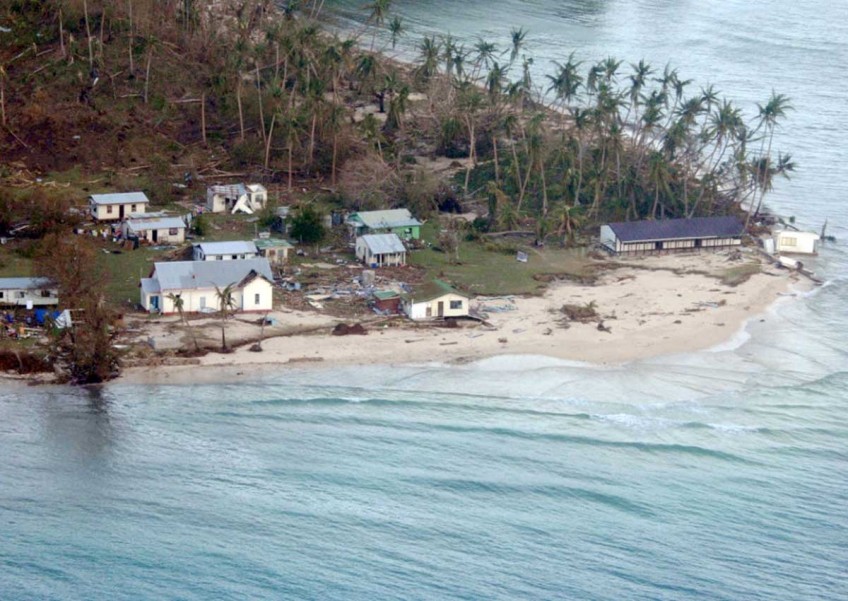Tourists flee Fiji as cyclone toll hits 17

Fiji - International tourists began fleeing cyclone-devastated Fiji on Monday as the death toll from the most powerful storm to ever hit the Pacific island nation jumped to 17.
Aid agency Care Australia confirmed the body count had risen steeply from six previously, with fears it will continue to climb after aerial photographs revealed entire villages had been flattened.
"Care Australia can confirm that figure of 17 dead," a Care spokesman told AFP after a briefing with disaster management officials in the Fijian capital Severe tropical cyclone Winston, the first category five storm in Fiji, hit overnight Saturday, packing wind gusts of 325 kilometres (202 miles) per hour.
No immediate breakdown of the fatalities was available but the Fiji Broadcasting Corporation reported many were from the hard-hit west of the country and seven fishermen were missing at sea.
The cyclone, the strongest ever recorded in the southern hemisphere, flattened scores of homes, crippled infrastructure and forced terrified residents to shelter in evacuation centres.
Photographs taken from a Royal New Zealand Air Force plane showed the devastation wrought on remote villages that bore the brunt.
Many homes were reduced to piles of kindling, with roofing and furniture strewn about by winds that were strong enough to strip leaves and branches from trees.
In one image, a lone man stands on the tin roof of his ruined home, apparently waving both arms at the military plane as it passes overhead.
Oxfam's Pacific regional director Raijeli Nicole said the scale of the disaster would only become apparent when communications were restored with such remote communities.
"The Fijians are desperately trying to repair severed lines of communication, but they hold grave fears that the news waiting for them will be dire," she said.
"Given the intensity of the storm and the images we have seen so far, there are strong concerns that the death toll won't stop climbing today and that hundreds of people will have seen their homes and livelihoods completely destroyed." International tourists caught up in the disaster began to leave as flights resumed at Nadi airport after a two-day suspension.
Air New Zealand confirmed one of its aircraft departed at 9:30am (2130 Sunday GMT) and other carriers including Jetstar, Virgin Australia and Fiji Airways were also expected to begin operations again.
Fiji's economy relies on tourism and the island chain is a major destination for Australians and New Zealanders.
Melbourne man Jeremy Bree told the Australian Broadcasting Corporation that he heard trees being ripped from the ground as he sat out the storm in a hotel at Denaru on the main island Viti Levu.
"It was pretty amazing just looking out and seeing the wind gusts just absolutely buffeting the trees," he said.
"The noise around was something I've never heard before, it was a real harrowing whine that came through." With communications still down in many areas, Tourism Minister Faiyaz Siddiq Koya assured that "all visitors are safe and comfortable." The airport's opening allowed aid efforts to ramp up, with Australia announcing a Aus$5.0 million (US$3.6 million) package including basics such as food and drinking water.
Foreign Minister Julie Bishop said Canberra had also offered the use of a P-3 Orion aircraft and MRH-90 helicopters to reach outlying islands.
The island nation has declared a month-long state of natural disaster after the storm that Prime Minister Voreqe Bainimarama described as an "assault on Fiji".
All schools, many of which are being used as evacuation centres, were ordered closed for one week and military leave has been cancelled so troops can help with the clean-up.
The acting head of the Red Cross's Pacific office Ahmad Sami said an accurate assessment of the impact would take time.
"We anticipate that humanitarian needs will be very high," he told AFP.
"This is the first time that Fiji has experienced a cyclone of this magnitude in their history, a category five, so we're still trying to find out the figures."
He said priorities were restoring power and repairing damaged homes, as well as maintaining drinking water supplies in more than 700 evacuation centres.